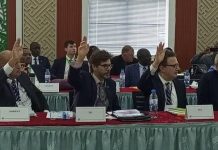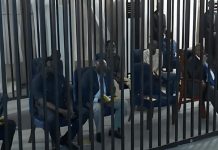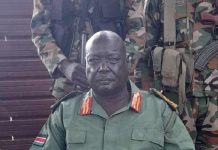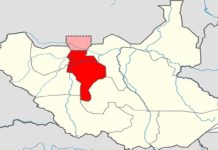Africa-Press – South-Sudan. The UN Panel of Experts on South Sudan says the government should manage the oil-for-roads program through the ordinary budget process to secure greater transparency in the public funds.
In 2019, the government signed a deal with Chinese construction companies to pump 30,000 barrels of crude oil per day, in exchange for infrastructure development.
The deal covers the ongoing construction of the Juba-Terekeka-Rumbek road, Juba-Bor road and other pending road projects.
However, the UN panel says the government, during its 2021/2022 financial year, received an excess of 535 million dollars in oil revenues period, but none of the revenues reached the treasury’s accounts from which salaries and ministerial budgets are paid.
In a letter addressed to the President of the Security Council on November 28th, the panel of experts stated that more than 50 per cent of oil revenues, amounting to 268 million dollars were allocated to the oil-for-roads program detailed in previous Panel reports.
The panel said an additional allocations – constituting three percent went directly to the Ministry of Petroleum and to the Nile Petroleum Corporation.
The group also said, about 135 million dollars in crude oil revenues – remained under the control of the Office of the President despite appeals from both Parliament and the Ministry of Petroleum to place it under control of the Ministry.
Excessive borrowing
The panel of experts said the figures reveal the extent to which South Sudan continues to rely on commercial borrowing to fill the gaps in its finances.
“During the first half of the 2021/22 financial year, around $200 million was allocated to repaying previously unreported loans from the National Investment and Development Bank of South Sudan, which has been providing short-term credit to the Government since October 2020,” the letter reads in parts.
“The loans, which have been repaid on a rolling basis, are worth a total of more than 675 million US dollars, with 540 million dollars borrowed during the 2021/22 financial year, End quote.
Yet, the UN said, an additional 150 million dollars was obtained from the International Monetary Fund.
The council said there were unclear reports about how these loans were spent or why short-term credit has been sought since October 2020.
However, it said documents prepared by the Ministry of Finance and Planning account for only 107 billion South Sudanese pounds, that’s around 237 million dollars in on-budget expenditure during that period.
In addition to the oil-for-roads program, the UN says, the gap helps to explain how ad hoc
off-budget spending, such as the procurement of vehicles and food for the military,
remains possible despite the financial pressures on the country’s budget.
It further said the 2022/23 budget shows a deficit of around 560 billion South Sudanese
pounds, creating pressure to borrow additional funds or reduce spending on salaries
and other budget lines.
The experts said an additional 135 million dollars has already been borrowed from the National Investment and Development Bank and figures seen by the Panel revealed significant borrowing from the Central Bank of South Sudan.
It revealed that the Central Bank printed more than 270 billion South Sudanese pounds between March and August 2022 which coincided with a significant depreciation in the value of the pound.
Decentralized public finance
The UN said the fragmented public finances has resulted in the accumulation and preservation of power at the national and sub-national levels require the ability to generate and distribute revenues.
This therefore, has created competition for access to positions of power at the national and local levels, as was previously witnessed in Tonj.
The UN officials also said the practice encourages the decentralization of the finances into
budgets and accounts over which individuals can assert control, undermining parallel efforts to centralize the country’s revenues and subject them to meaningful oversight.
It added that this is exemplified by the continued diversion of public funds, and oil revenues
in particular, into accounts and projects managed outside the budget process.
Such diversions threaten to undermine the impact of the country’s public financial
management reforms, many of which are focused on the budget process, the group said.
For More News And Analysis About South-Sudan Follow Africa-Press






